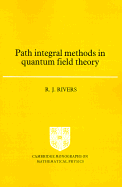Book contents
- Frontmatter
- Contents
- Preface
- 1 Scalar Green functions and their perturbative solutions
- 2 Connected Green functions and their one-particle irreducible components
- 3 Regularisation and renormalisation
- 4 The scalar functional integral
- 5 Series expansions and their summation
- 6 Taking the path integral more seriously
- 7 Quantum theory on non-simply-connected configuration spaces
- 8 Stochastic quantisation
- 9 Fermions
- 10 Quantum electrodynamics
- 11 Non-Abelian gauge theories
- 12 Explicit symmetry breaking and its classical limit
- 13 The effective potential
- 14 Field theory at non-zero temperature
- 15 Field theory at non-zero temperature: real-time formulation
- 16 Instantons
- 17 Composite fields and the large-N limit
- References
- Index
17 - Composite fields and the large-N limit
Published online by Cambridge University Press: 04 April 2011
- Frontmatter
- Contents
- Preface
- 1 Scalar Green functions and their perturbative solutions
- 2 Connected Green functions and their one-particle irreducible components
- 3 Regularisation and renormalisation
- 4 The scalar functional integral
- 5 Series expansions and their summation
- 6 Taking the path integral more seriously
- 7 Quantum theory on non-simply-connected configuration spaces
- 8 Stochastic quantisation
- 9 Fermions
- 10 Quantum electrodynamics
- 11 Non-Abelian gauge theories
- 12 Explicit symmetry breaking and its classical limit
- 13 The effective potential
- 14 Field theory at non-zero temperature
- 15 Field theory at non-zero temperature: real-time formulation
- 16 Instantons
- 17 Composite fields and the large-N limit
- References
- Index
Summary
In the previous chapters we have only quantised classical fields, in that we have assumed that the quanta of the theory can be identified with fields already present in the classical action.
We know that this is untrue for hadrons, which form the overwhelming majority of any particle listing. QCD tells us that, in some complicated way, all hadrons are composite entities made from gluons and quarks. For this reason we have avoided applications that have involved them. However, arguments can be made for a much greater degree of compositeness than hadrons alone. As we have seen, the number of quarks and leptons in grand unified models is considerable. We have already mentioned three families. There may be more. It is quite possible that leptons and quarks are not elementary entities but are themselves composite.
Secondly, we have noted in passing that the breaking of symmetry by elementary Higgs fields requires incredibly fine tuning of parameters. This is a pointer towards taking the classical field theory as an effective low-energy approximation for a theory with composite Higgs particles. Further limitations to the classical models exist that might by improved by extending compositeness to the heavy gauge bosons and even to photons and gluons.
The literature on compositeness is extensive. As an example, we cite Peccei (1983) for a summary of recent ideas.
Information
- Type
- Chapter
- Information
- Path Integral Methods in Quantum Field Theory , pp. 309 - 329Publisher: Cambridge University PressPrint publication year: 1987
